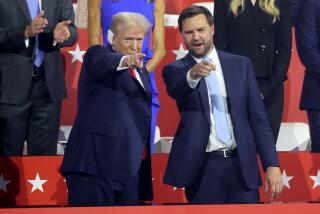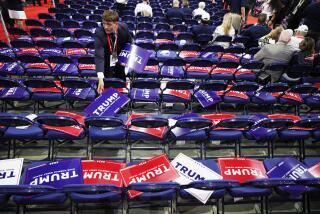Romney, Clinton shake up tactics
- Share via
CEDAR RAPIDS, IOWA -- — Facing fresh polls showing their leads in Iowa disappearing, Democratic presidential candidate Hillary Rodham Clinton and Republican Mitt Romney rolled out new campaign tactics Sunday in an aggressive push to regain lost momentum.
Sen. Clinton of New York, who until recently would not even mention her rivals by name, used a news conference to question the ethics, character and “courage” of Illinois Sen. Barack Obama, employing the most pointed language she has used in the campaign.
Romney announced that he would deliver a speech Thursday on religion, a subject that he has been reluctant to touch despite growing signs that voters are leery of putting a Mormon in the White House. As recently as last week, Romney’s eldest son, Tagg, said in an interview that he was beseeching his father to give such a speech but had yet to persuade him.
The steps reflect the rapidly shifting dynamics in Iowa, whose caucus is set for Jan. 3. For months, both Clinton and Romney held strong leads in Iowa. But a Des Moines Register poll published Sunday showed that their advantage had collapsed. Romney was trailing former Arkansas Gov. Mike Huckabee, 24% to 29%. Clinton was in second place behind Obama, 25% to 28%.
Both Romney and Clinton would be shaken by a loss in this crucial state. Clinton has cast herself as the inevitable nominee, and a defeat here would shatter perceptions that she can’t be stopped. Romney has spent heavily on campaign ads in Iowa, hoping for an early victory to impress Republican voters in other states, where he is not so well known.
That Romney and Clinton would shake up the playbook with the caucus just a month away underscores the worry in both camps.
“It’s really without precedent,” said Gordon Fischer, a former chairman of the Iowa Democratic Party. Fischer, who is backing Obama, said: “They’re both very, very concerned. They were the front-runners who are no longer front-runners.”
Romney’s speech will lay out how his faith would “inform his presidency,” his campaign said Sunday. It echoes an address given 47 years ago by John F. Kennedy about his Catholicism when he was running for president. The speech comes amid polling that shows conservative Christian voters beginning to coalesce around Huckabee, a Southern Baptist preacher.
A recent survey by Rasmussen Reports showed that 48% of evangelical Christians in the Iowa GOP supported Huckabee -- more than all the other candidates combined.
David Kuo, an evangelical Christian and former White House official for faith-based programs, said of Romney: “At the end of the day, the vast majority of evangelicals consider Mormonism to be a cult. And that’s his big problem.”
Romney has faced pressure to deliver such a speech from some in his family and other leading Mormons such as Sen. Orrin G. Hatch (R-Utah). They have argued that Romney might lose the nomination if he fails to convince religious Christians that a Mormon is one of them.
Clinton, after a campaign rally urging Iowans to go to the caucus, said at a news conference that she would spend much of the next four weeks alerting voters to what she cast as a troubling gap between Obama’s high-minded rhetoric and his political performance.
“Well, now the fun part starts,” Clinton said. “We’re into the last month, and we’re going to start drawing a contrast, because I want every Iowan to have accurate information when they make their decisions.”
Within hours of Clinton’s news conference, Obama issued a statement saying: “This presidential campaign isn’t about attacking people for fun. It’s about solving people’s problems, like ending this war and creating a universal healthcare system.”
Clinton mentioned a pair of issues that she said undermined Obama’s claim that he would practice a nobler form of politics: his healthcare proposal and his management of a special fundraising committee.
Obama, she said, has made conflicting statements about whether he is offering a healthcare plan that is truly universal in coverage. And one of his fundraising committees, Hopefund, has been giving money to politicians in states that hold the earliest contests in the 2008 election, in what she called a possible violation of Federal Election Commission laws.
“You can’t get a straight answer [from Obama] on healthcare,” she said. “Someone who runs on ethics and not taking money from certain people is found out to have at least skirted, if not violated, the FEC rules and used lobbyist and PAC money to do so.”
She added that the difference between them was one of character.
“It’s beginning to look a lot like that,” she said.
Countering the charges at a news conference of his own in Des Moines, Obama said: “I think that folks from some of the other campaigns are reading the polls and starting to get stressed and issuing a whole range of outlandish accusations. Everything that we’ve done is in exact accordance with the law.”
Direct criticism hadn’t been part of Clinton’s repertoire. Over the summer, her husband told crowds in the same city, Cedar Rapids, that there was no need to denigrate any Democratic candidate in the race.
The former president said in July: “As a citizen, I like this election because I don’t have to be against anybody.”
With Iowa up for grabs, his wife’s campaign now seems convinced that a strictly positive message won’t work. Hillary Clinton also suggested that some of the criticisms she has absorbed from her rivals have taken a toll.
“I have said for months that I would much rather be attacking Republicans and attacking the problems of our country,” she said. “Because ultimately that’s what I want to do as president. But I have been four months on the receiving end of rather persistent attacks.”
History suggests that Iowa candidates do not win votes by going on the attack. Four years ago, onetime front-runner Richard A. Gephardt targeted Vermont Gov. Howard Dean -- and both lost. A negative campaign between Clinton and Obama could clear a path in Iowa for former North Carolina Sen. John Edwards, who had 23% support in the new poll.
Romney’s address, titled “Faith in America,” is to be given at a Republican landmark squarely in the traditional Bible belt: the George H.W. Bush presidential library in College Station, Texas.
“This speech is an opportunity for Gov. Romney to share his views on religious liberty, the grand tradition religious tolerance has played in the progress of our nation,” said campaign spokesman Kevin Madden.
Madden said Romney “personally made the decision to deliver this speech sometime last week” and said he consulted former President Bush, who offered the library as a venue.
The elder Bush will introduce Romney at the event, but Madden said that should not be considered a campaign endorsement.
George H.W. Bush was never very popular among the evangelicals being courted by Romney, but his son George W. Bush drew heavy support from that voting bloc and remains popular among religious conservatives.
Until this point in the campaign, Romney has been reluctant to discuss his Mormonism. He has sought to close the deal with evangelicals by showcasing his strong marriage, five strapping sons and increasingly conservative views on social issues.
Yet at the campaign’s highest levels there was a clear recognition that many Republican voters are uneasy about electing a Mormon.
“I’ve told him he ought to give” the speech, Tagg Romney, 37, Romney’s eldest son and an senior advisor to the campaign, said in an interview last week before the decision was announced. “I just think it’s an issue for some people. Better for him to get out there and tell people, ‘This is who I am.’ ”
He said his father could use the address, just as Kennedy did in 1960, to assure voters he would be independent from the church.
“He would not be taking direction from church authorities on any legal matter or in the way he governs at all,” Tagg Romney said.
As Romney has lost ground, Huckabee has been gaining. He got wild applause at a major Values Voters conference in October. Seeing an opening, Huckabee is airing a 30-second spot in Iowa that flashes the words “Christian leader” over his image.
Romney’s Mormonism “is definitely a factor in the race,” said one Huckabee aide, who spoke on condition of anonymity because the aide is not authorized to talk publicly. “To a lot of people, [Mormonism] is a strange religion that they don’t understand.”
Romney’s challenge with evangelicals was evident last week when he appeared flummoxed by a question during the CNN-YouTube candidates debate about whether he believed the Bible was true. He seemed to rely on legalisms to work through an issue that he knew to be sensitive. “You know -- yes, I believe it’s the word of God, the Bible is the word of God. . . . I mean, I might interpret the word differently than you interpret the word,” he said.
Former White House official Kuo saw Romney’s response as a missed opportunity.
“He easily could have taken that question and in some ways put the faith issue to rest,” Kuo said. “And instead he just added fuel to the fire.”
Nicholas reported from Cedar Rapids, Wallsten from Washington.
More to Read
Get the L.A. Times Politics newsletter
Deeply reported insights into legislation, politics and policy from Sacramento, Washington and beyond. In your inbox three times per week.
You may occasionally receive promotional content from the Los Angeles Times.










